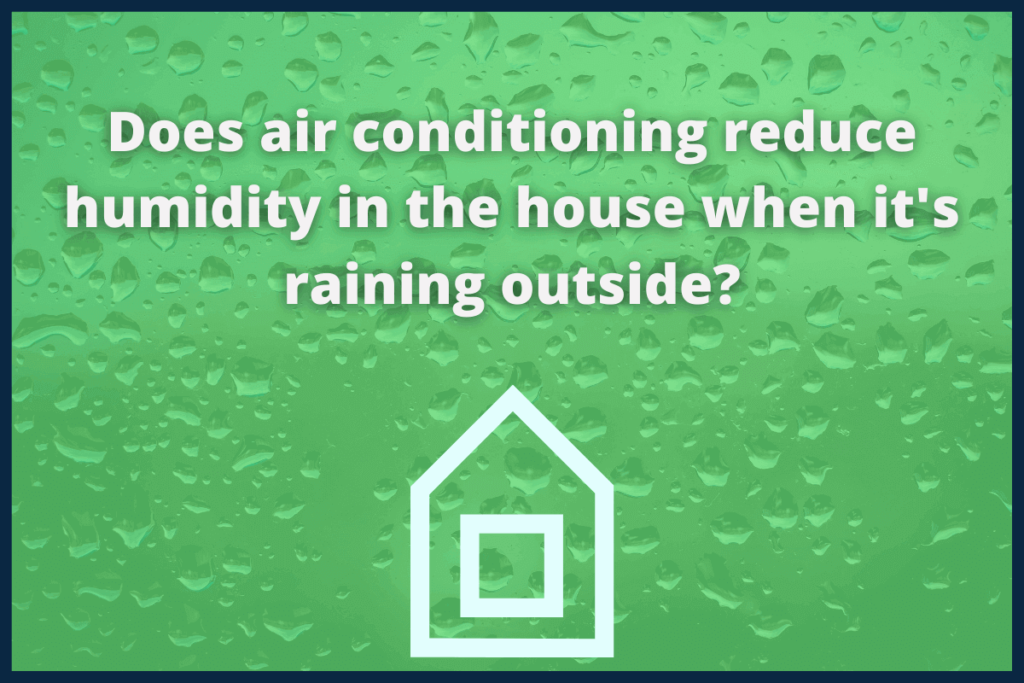Yes, air conditioning does reduce the humidity in the house when it’s raining outside because it is pulling moisture from the air in order to cool the house.
The more humid the air, the more likely you are to experience heatstroke and other health-related problems such as sleep apnea or asthma. On days when rainstorms make it difficult or impossible to open windows and let cooler air circulate, turn on the AC and keep yourself at a healthy temperature!
If you don’t have an air conditioner or if your unit is broken, fear not. There are other ways to control humidity levels in your home. You can use dehumidifiers or portable fans to reduce humidity levels in certain rooms of your home.
If humidity levels are not reduced in the house, mold and mildew growth will be very likely. This can lead to respiratory problems or even worse health complications if allergens are left untreated.
The best way to ensure safety against humidity-related ills is to own an air conditioner. Heatstroke can be serious, and there is no reason to forfeit your health on the hottest of days.
- How can I lower the humidity in my house when it rains?
- How to reduce humidity in the rainy season
- Changing air filters regularly is important. If you change the filter, then it will work better and remove dust and humidity from the air.
- Outside of the home, make sure that you clean out the HVAC unit. Clear it of any storm debris.
- A whole-house dehumidification system removes excess moisture from the air. It is a good idea for your house if it starts to feel humid.
- The benefits of a whole-house dehumidification system:
- If you notice that there is excess moisture in your home, it could be a sign of a leak.
- Does rain make the house more humid?
- Why is humidity dangerous to your health and how does AC help with this problem
- What is the best way to deal with high levels of humidity if you don't have an AC unit or it's broken?
- Ways to tell if your home has too much moisture in the air (e.g., condensation on windows) and what can be done about this issue?
How can I lower the humidity in my house when it rains?
It is important to let your HVAC system be on when it rains or snows. You need it to be active so that you will be comfortable in the house.
In the springtime, we love opening our windows and taking in the warmer air. We might turn off our HVAC units and wait until June to turn them back on. But it is better for your unit and your home to use it a little bit during the spring.
You do not need to run your heating and air conditioning system as much during the spring. You can set it at a comfortable temperature that will let the HVAC system turn on sometimes. This will help you find any problems before summer starts.

How to reduce humidity in the rainy season
- Ventilate your house
- Air conditioning
- Use fans
- Use dehumidifiers
- Replace ac filters regularly
- Clean the coils on your HVAC unit
- Use ceiling fans to circulate air and generate a cooling sensation
- Shorter or colder showers are options
- Line dry clothes outdoors
- Use a dehumidifier
- Reduce showers to five minutes or less during humid days
- To increase airflow, open a window to allow the air to dry out in damp places such as the bathroom and kitchen
- Temporarily place your plants outdoors. Also, make sure to not over-water your plants
- Use your kitchen exhaust fans to clear out the air
- Charcoal briquettes have adsorption properties, which can help to remove humidity and even scents from the air
Changing air filters regularly is important. If you change the filter, then it will work better and remove dust and humidity from the air.
Poor airflow can cause problems in your HVAC system. If the air is not moving well, it will stop dehumidifying. You should change the filters every month or when they get dirty and full of debris.
Outside of the home, make sure that you clean out the HVAC unit. Clear it of any storm debris.
After storms have passed, make sure that your outdoor unit is free of leaves and sticks. If it isn’t, then the airflow won’t work and your home will be humid.
A whole-house dehumidification system removes excess moisture from the air. It is a good idea for your house if it starts to feel humid.
The benefits of a dehumidifier are that it will remove the humidity, the air will feel cooler, and you won’t have to run an air conditioner as much.
You can buy whole-house dehumidifiers at any HVAC store. They are not very expensive either. You can also find them on Amazon or at home improvement stores.
A dehumidifier does these basic things:
– It removes excess humidity from the air in your house or room
– The more moisture it pulls, the cooler the air will feel
– It helps to lower your setting for an air conditioner
– Does not cool down the whole house like an AC unit does though!
A dehumidifier also keeps certain areas dry. For example, if your air conditioner is not working well in one room of the house, then you should put a dehumidifier in that room instead. It will do better than using a portable fan alone.
A whole-house dehumidification system helps to reduce humidity without running up your energy costs too much.
The benefits of a whole-house dehumidification system:
- Whole-house dehumidification systems are an excellent way to keep relative humidity levels steady, even when your HVAC unit is not engaged. It’s a great solution for homeowners who find themselves lowering the thermostat often because their house is stuffy.
- The benefits of a whole-house dehumidification system are many, and it will help you save money on your energy bills. Some key points to consider when making the decision include that they draw less amperage than HVAC units and maintaining consistent humidity levels can allow your main unit to engage less often even during the summer.
- If you want to avoid the development of mold in your home, the best way is to fight moisture. A dehumidification system dries out air more efficiently than a heating and cooling unit can do on its own.
- If you’re experiencing humidity and want to prevent your HVAC system from short-cycling, it might be time for a whole-house dehumidifier. A whole-house unit will keep the air in your home dry all year long without any work on your part. They can also help protect against mold growth as well as other health issues associated with high levels of moisture like allergies and asthma.
If you notice that there is excess moisture in your home, it could be a sign of a leak.
Look for indications of excessive dampness, particularly in your basement, kitchen, bathrooms, and other areas of your property that are vulnerable to it. Excess moisture may be detected by looking for any of the following:
- Condensation is when water droplets form on surfaces
- Water spots or damage
- Mildew or mold growth may occur
Does rain make the house more humid?
After a rainstorm, your house can be more humid because the rain transfers its moisture content to the air around it. If it is hot outside, then the water will evaporate faster and make your house more humid.
Why is humidity dangerous to your health and how does AC help with this problem
Humidity levels in the air may be an issue for many people. The higher the level of humidity, the more likely it is that you will experience problems like asthma or heatstroke. One solution to this problem is to turn on your AC if it’s too humid outside. The air conditioning lowers the humidity because it removes moisture from the air, making your space seem cooler.
The more humid your home becomes, the more likely you are to feel exhausted and need to take a break.
What is the best way to deal with high levels of humidity if you don’t have an AC unit or it’s broken?
To deal with high levels of humidity without an AC unit, you can open windows and try to get a fan going. Keep windows open as often as you can if it’s not raining, because this will allow moisture to escape instead of getting trapped inside the home.
The air in your kitchen and bathroom can get very sticky, especially if it doesn’t have a vent or fan. This is because of the humidity from cooking on the stove with boiling water or taking hot showers. If you don’t have vents for these rooms, open up a window after you shower to let some fresh air inside and take shorter showers with lower-temperature water. You can also use lids when cooking to keep steam from escaping as much as possible!
If you’re feeling hot and sweaty, turn on your fan. Ceiling fans offer an inexpensive way to cool down and make yourself feel better in the summertime.
Not only do they create a refreshing breeze that helps to evaporate sweat from our skin, but their moving air also encourages moisture evaporation.
Fans can’t do it all by themselves when battling humidity; however, their constant movement will help keep the air more uniform around your house with less stagnant spots of warm air hanging out where we don’t want them.
Ways to tell if your home has too much moisture in the air (e.g., condensation on windows) and what can be done about this issue?
The first way to tell if your home has too much moisture in the air is if you see any condensation on your windows.
It’s also possible for you to measure the level of humidity in your home by using a hygrometer (a device that gauges humidity).
The second sign of high levels of moisture is mildew or mold growth. If you notice these, it may be time to turn on your AC unit or get a whole-house dehumidification system to dry out the air in your home.
Conclusion
Does air conditioning reduce humidity in the house when it’s raining outside? Does rain make your home more humid and what can you do to alleviate this problem if you don’t have AC or a whole-house dehumidification system? This article teaches how to keep yourself cool, comfortable, and healthy with tips on how to control humidity levels in the home if they become too high.
